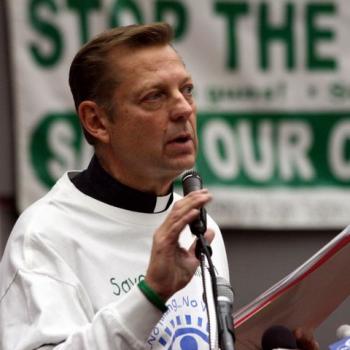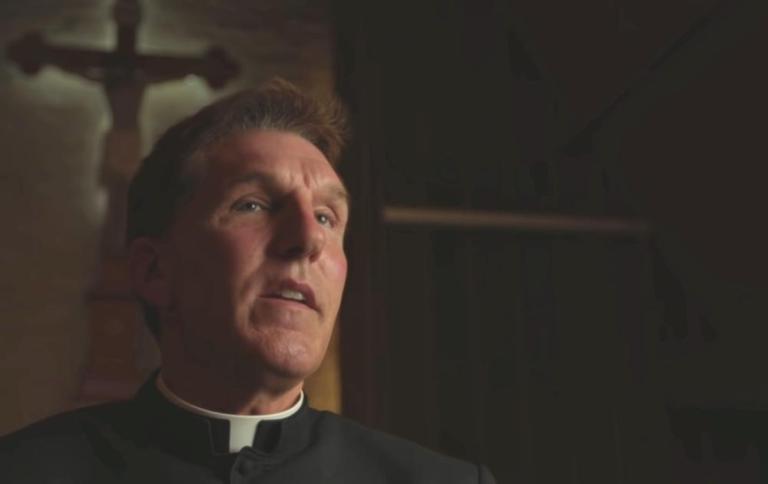
“What we did with Norma was highly unethical. The jig is up.”
That eye-opening comment from evangelical minister Rob Schenck in the new FX documentary, “AKA Jane Roe,” marks a dramatic final revelation in the story of Norma McCorvey, the plaintiff in Roe V. Wade, the case that led to the U.S. Supreme Court legalizing abortion in 1973.
Claiming to have undergone a pro-life conversion in the mid-1990s, McCorvey was held up for years by pro-life leaders as a dramatic example of God’s redemptive work. Norma spoke at the March for Life. She appeared in promotional pro-life spots on EWTN, and wrote about her journey into the Catholic Church in 1998.
When McCorvey died at age 69 from heart failure in 2017, some Catholic media outlets eulogized her as someone who had devoted her adult life to atoning for her past abortion-related sins.
But if Schenck’s comments and McCorvey’s own words are to be believed, then her pro-life conversion was an act, her advocacy for the unborn nothing more than a series of paid appearance and speeches, no different than how a free agent pitcher can win the Cy Young Award with the Boston Red Sox one season and pitch Opening Day the next year for the New York Yankees.
“One day, you’re selling Nissans. The next day, you’re selling Chevy’s. It depends on who you’re getting your paycheck from,” Schenck said.
At least Schenck, who over the years has expressed remorse for his early tactics in the pro-life movement, appears to have contrition as he fesses up to his own role in “coaching” Norma and paying her hundreds of thousands of dollars over the years in “benevolence gifts” that kept her on the pro-life side of the contentious national debate. You can see his conscience at work.
I don’t think you can say the same for someone like the Rev. Flip Benham, the evangelical minister and national leader of Operation Save America, the organization that grew out of Operation Rescue, the controversial militant anti-abortion group that made headlines for blockading abortion clinics in the 1990s.
“She chose to be used. That’s called work,” Benham says in a telling comment when the filmmakers press him on the payments that McCorvey received over the years from Operation Rescue and other elements of the pro-life movement. Just before inadvertently admitting to McCorvey’s paid role in the movement, Benham is shown denying such payments were ever even made. To show his sincerity, he kisses a Bible.
That sacrilegious act and Benham’s subsequent justifications for using McCorvey as a hired gun for the pro-life cause show what can happen when one loses perspective. The holy grail of overturning Roe v. Wade and saving the unborn can, and apparently has, lead some people in the pro-life movement to sacrifice their ideals, values and integrity.
“I think it was a mutual thing. I took their money and they’d put me out in front of the cameras and tell me what to say. That’s what I’d say… I did it well too. I am a good actress,” McCorvey says in one notable scene recorded a few months before her death.
Norma the Poster Child
The story of Norma McCorvey, a tortured soul who suffered horrific trauma in her life that included being sexually abused as a child, calls for some substantial soul-searching and reflection, indeed an Examination of Conscience, among anyone claiming to be pro-life, or pro-choice for that matter.
Both sides used her for tactical advantages in the legal and cultural battles over abortion. She was a sought-after poster child, someone who could sign an affidavit to get the ball started on Roe v. Wade and who could later march alongside pro-life leaders in Washington D.C. Her conflicted humanity and identity as a child of God seem to have been afterthoughts.
If anything, the impression one has from listening to McCorvey’s own words and examining her life against the backdrop of the culture wars’ abortion battles over the last 40 years is that she never even really saw abortion as her fight. In the end, Norma seemed to dislike both sides.
“If a young woman wants to have an abortion, fine. That’s no skin off my ass. That’s why they call it choice. It’s your choice,” Norma says in one private moment recorded in late 2016.
In failing health and breathing with the assistance of an oxygen tank, Norma tells the camera that her pro-life advocacy was “all an act.” In her “deathbed confession,” as she puts it, Norma says she was the “big fish” for the pro-life movement. She also has choice words for some of its leaders.
“They’re a**holes. They all act like God sent them to preach the gospel,” Norma says.
If that statement alone doesn’t shock you, then I would argue that some scenes, filmed during the 2016 presidential election season, really capture how different Norma’s “behind-the-scenes” persona was from the carefully cultivated image we saw for so many years in Christian media.
Here we see Norma – her body giving out on her but her mind still appearing sharp – watching election coverage, declaring her support for Hillary Clinton and badmouthing Donald Trump, even wondering if Trump, the declared pro-life candidate, had lost count of the all abortions he had allegedly procured in his younger years.
“If he can count that high,” says Norma, who utters a profane comment when she wakes up the morning after Election Day 2016 and learns Trump won the election. “I’m gonna get sick,” says Norma, who only the night before had sounded hopeful when Clinton won New York as the election results started to come in.
“Roe’s not going anywhere,” Norma said with a defiant tone. “They can try, but it’s not going anywhere baby.”
Who was Norma?
How do you reconcile the Norma McCorvey you see and hear in this documentary with the Norma McCorvey we heard all those years telling pro-life audiences how she regretted her earlier advocacy on behalf of legal abortion, how she had come to accept Jesus into her heart, and how the Lord had helped her to realize the humanity of the unborn?
Some high-profile people in the national pro-life movement have chosen the tried-and-true tactic of “blame the media,” alleging pro-abortion bias among the filmmakers, whom they also have accused of manipulating McCorvey into renouncing her pro-life views or somehow twisting her own words against her.
A few in the pro-life community also cite, as evidence, their own private interactions with Norma, believing the woman they remember from their conversations, email exchanges and phone calls over a 20-year period was the real Norma McCorvey. They never appear to consider the possibility that she might have been playing them the whole time, or that her pro-life views were never really that solid to begin with.
It’s easier to dismiss disturbing revelations against someone you thought you knew than it is to honestly wrestle with what’s being alleged and to see if the new information that comes forward somehow challenges you to reconsider previously-held beliefs, assumptions and ways of doing things.
One thing that more than 15 years of being a police reporter for the local daily newspaper taught me is that people are COMPLICATED. We are filled with contradictions in our own personalities and characters, some more than others. The same friendly neighbor who always smiles at you and says hello is capable of being arrested for a homicide if the dark side of their personality is that troubled.
It doesn’t shock me that Norma McCorvey may have been a paid spokeswoman, capable of switching allegiances to Planned Parenthood if the Operation Rescue paychecks didn’t come through, for the same reason that it never shocked me when a respected schoolteacher was arrested for child sexual abuse, or when a beloved NFL tight end was charged with and later convicted of murder.
We can think we know someone, but in the end only they know what’s really happening inside the maelstrom of their inner life.
“I know what we were doing, and there were times when… I wondered, ‘Is she playing us?'” Schenck tells the filmmakers in a moment of contrite reflection. He adds, “What I didn’t have the guts to say was, ‘Because I know damn well we’re playing her.'”












